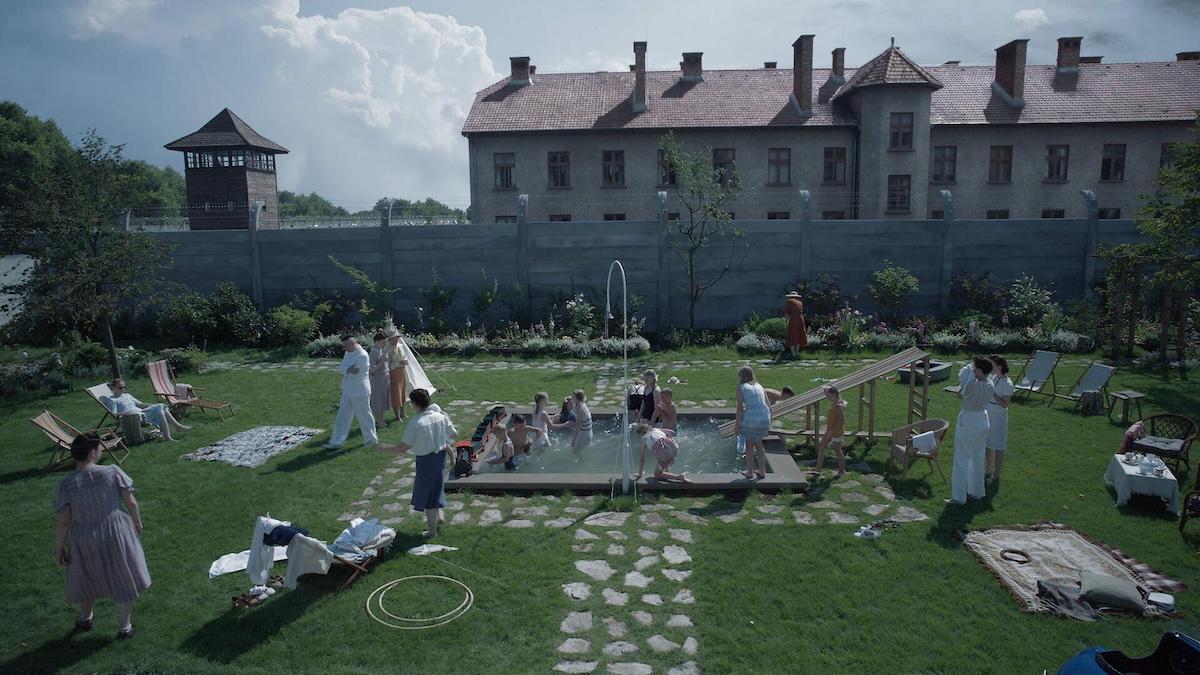Jonathan Glazer has been nominated for two Oscars, as writer and director of The Zone of Interest, a movie about Nazis that was also nominated for Best Picture and Best International Film. The day the movie premiered in Cannes, last May 19, the novelist whose work inspired Glazer, Martin Amis, died. I’m not sure we have any impressive novelists in English anymore. Our culture is now cinema. Glazer won the Grand Prix in Cannes and was also nominated for the Palme D’Or. He has since won BAFTAs and other awards, and his movie has received endless nominations around the world.
Back to the Nazis. It’s hard to make interesting movies about Nazis anymore, but it’s also hard to make movies about anything else. In previous times, people may have feared the devil and hellfire; now they have been replaced by Hitler and the Holocaust. Everything about modern morality and power seems to turn on it. It’s rarely clear whether we are horrified because Nazism is an attack on civilization or because we ourselves also reject civilization, identifying it with both inhuman and political technologies, whether ideological or bureaucratic.
Amis’ The Zone of Interest is the story of a fictitious love affair in the shadow of Auschwitz; the issue for Amis is whether human nature can have any part of beauty in the face of horror. Glazer’s movie is much more direct: it follows camp commander Rudolph Höss and his family, who are trying to live the most pleasant and even luxurious life they can while he works. The Holocaust is his job and he worries about losing credit or his position, but he doesn’t take the work home. His children know nothing; he hides everything he can. Humanity is a Polish girl hiding apples by night in the trench where the slave workers will toil by day; it’s the true story of a woman, Alexandra, whom the director met when she was 90.
Glazer accordingly doesn’t show the horror of the extermination camp. It’s just background noise. Gunshots. Höss deals with the problem by hiring a guy to rev an engine next to his house, to drown out that noise. Half an hour into the movie, we finally hear the sounds of horror, men, women, and children crying and screaming as they’re offloaded from a train and taken to the camp where they’ll be humiliated and murdered. The movie starts with ominous music over a black screen, for minutes, to prepare for this theme.
The title of the film is a euphemism, revealing the care put into hiding the ugly reality of genocide. It’s important to know that the Nazis felt it was useful, maybe necessary, to hide what they were doing. Höss orders the camp guards to stop picking lilac flowers; the bushes are meant to be ornamental. The women of his household enjoy the loot the men take from the female prisoners—the clothes, for example.
We always ask how sophisticated modern people, among the most educated in the world, could have done something so barbarous? How can humanity be so weak and unprotected? Even Höss knows fear. Every night he locks the doors of his house, methodically, and yet as though he were careless of the very things that make him lock down in the first place. He’s horrified when his children, bathing with him in the river, are polluted by the consequences of the extermination camp.
The major theme of the movie seems to be the opposition between loving one’s family and committing terrible injustice against the families of strangers. What’s missing in the story is politics, the activity and way of life that makes for civilization or tyranny, the best or worst in us. Glazer shows domestic life and invites viewers to wonder what’s missing in it that could leave people vulnerable to such terrible corruption. This points to a fundamental problem in modern life, that we all prefer private life and are therefore not able to act publicly. It’s that absence that invites tyranny. There is something in our own innocence that needs rethinking, because while being blameless, committing no crime, we do not fulfill public duties that would demand noble sacrifice, win honor, and fend off horror.
That emptiness is exploited by the manly nihilism of the Nazis. Höss goes around on horseback, in cavalry breeches, everyone coming to toast his health at his birthday party is in uniform, and his sons like their uniforms, too. You could call this playacting, or LARPing. But it’s also a way of revealing that domestic life calls somehow for noble protection and manly strength. Despised or neglected, that spirit gives power to evil.
Glazer, in avoiding showing the horror, spares his viewers. But in not using art to brutalize sentiment, he encourages viewers to consider the problem of humanity, to not reduce Hitler or Höss to the devil, to remove thus the glamour of evil, the suggestion that it’s overpowering, inevitable. Evil is in some sense human, yet it’s hard to say how. Glazer shows that much of family life should have led Höss to avoid evil, not to work with intelligence and diligence to design and execute murder with industrial power. Every attempt to conceal the crime reveals the shame of which even the servants of tyranny are capable.
There is much that’s persuasive about The Zone of Interest, but it’s not equal to its task, that of revealing decadence and tyranny. The problem for art is that there are not enough noble men among us. Artists looking for some tragic insight, some combination of innocence and guilt, seem stuck looking at criminals and madmen. And meanwhile in our own lives we despise nobility, humiliate men, and so have ended up in such a sorry state in both America and Britain that we can’t encourage young men to join the military. Failing recruitment in a volunteer army in a democracy should shock public opinion. As decadence goes, there’s a relation between the vicious and the weak, those who are paralyzed and those who are outrageous. We must learn again what it means to protect what’s delicate and human.

